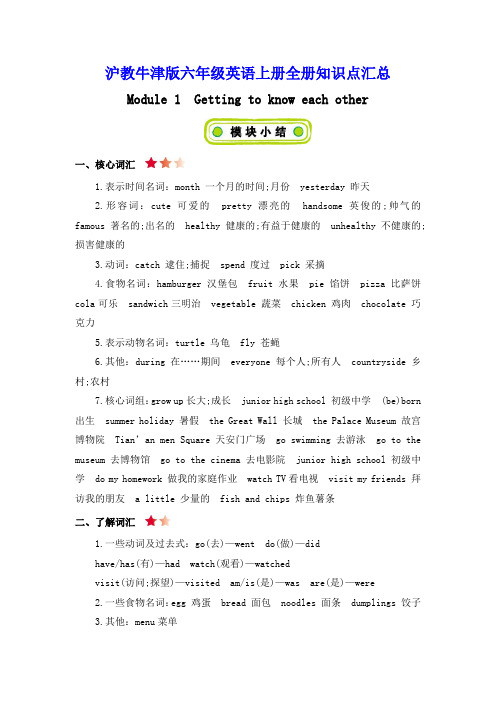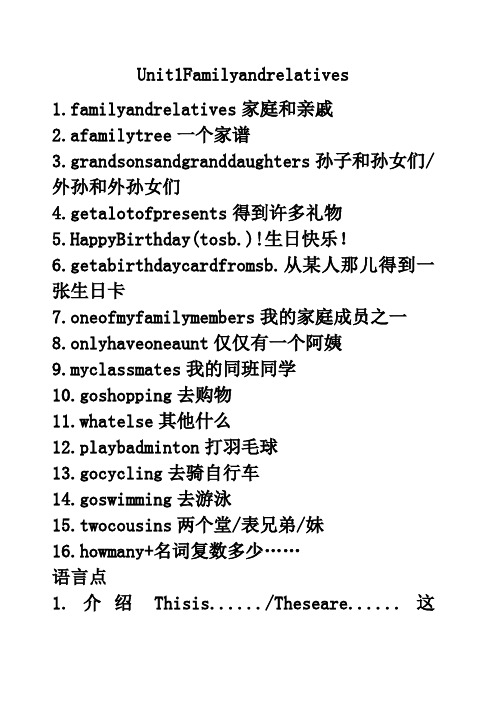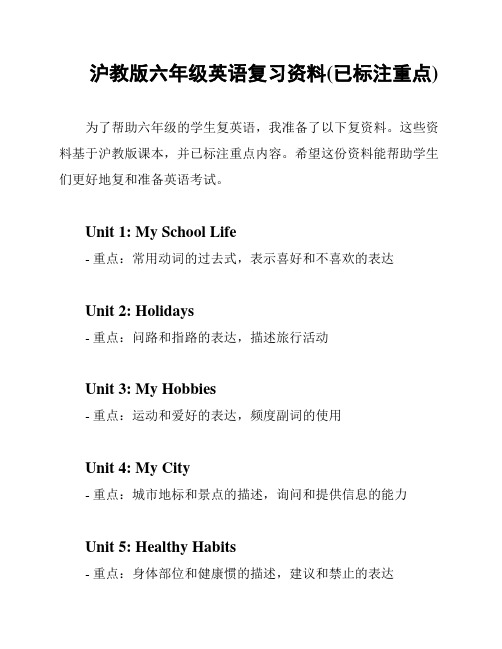沪教版六年级英语上册全套复习资料
沪教牛津版六年级英语上册全册知识点点汇总

沪教牛津版六年级英语上册全册知识点汇总Module 1 Getting to know each other一、核心词汇1.表示时间名词:month 一个月的时间;月份yesterday 昨天2.形容词:cute 可爱的pretty 漂亮的handsome 英俊的;帅气的famous 著名的;出名的healthy 健康的;有益于健康的unhealthy 不健康的;损害健康的3.动词:catch 逮住;捕捉spend 度过pick 采摘4.食物名词:hamburger 汉堡包fruit 水果pie 馅饼pizza 比萨饼cola可乐sandwich三明治vegetable 蔬菜chicken 鸡肉chocolate 巧克力5.表示动物名词:turtle 乌龟fly 苍蝇6.其他:during 在……期间everyone 每个人;所有人countryside 乡村;农村7.核心词组:grow up长大;成长junior high school 初级中学(be)born 出生summer holiday 暑假the Great Wall 长城the Palace Museum 故宫博物院Tian’an men Square 天安门广场go swimming 去游泳go to the museum 去博物馆go to the cinema 去电影院junior high school 初级中学do my homework 做我的家庭作业watch TV看电视visit my friends 拜访我的朋友 a little 少量的fish and chips 炸鱼薯条二、了解词汇1.一些动词及过去式:go(去)—went do(做)—didhave/has(有)—had watch(观看)—watchedvisit(访问;探望)—visited am/is(是)—was are(是)—were2.一些食物名词:egg 鸡蛋bread 面包noodles 面条dumplings 饺子3.其他:menu菜单三、核心句型1.Her hair was short and her eyes were big. 她那时头发很短而且眼睛很大。
沪教牛津版六年级英语上册全册知识点点汇总

沪教牛津版六年级英语上册全册知识点汇总Module 1 Getting to know each other一、核心词汇1.表示时间名词:month 一个月的时间;月份yesterday 昨天2.形容词:cute 可爱的pretty 漂亮的handsome 英俊的;帅气的famous 著名的;出名的healthy 健康的;有益于健康的unhealthy 不健康的;损害健康的3.动词:catch 逮住;捕捉spend 度过pick 采摘4.食物名词:hamburger 汉堡包fruit 水果pie 馅饼pizza 比萨饼cola可乐sandwich三明治vegetable 蔬菜chicken 鸡肉chocolate 巧克力5.表示动物名词:turtle 乌龟fly 苍蝇6.其他:during 在……期间everyone 每个人;所有人countryside 乡村;农村7.核心词组:grow up长大;成长junior high school 初级中学(be)born 出生summer holiday 暑假the Great Wall 长城the Palace Museum 故宫博物院Tian’an men Square 天安门广场go swimming 去游泳go to the museum 去博物馆go to the cinema 去电影院junior high school 初级中学do my homework 做我的家庭作业watch TV看电视visit my friends 拜访我的朋友 a little 少量的fish and chips 炸鱼薯条二、了解词汇1.一些动词及过去式:go(去)—went do(做)—didhave/has(有)—had watch(观看)—watchedvisit(访问;探望)—visited am/is(是)—was are(是)—were2.一些食物名词:egg 鸡蛋bread 面包noodles 面条dumplings 饺子3.其他:menu菜单三、核心句型1.Her hair was short and her eyes were big. 她那时头发很短而且眼睛很大。
沪教版六年级英语上册 全套复习

Unit1Familyandrelatives1.familyandrelatives家庭和亲戚2.afamilytree一个家谱3.grandsonsandgranddaughters孙子和孙女们/外孙和外孙女们4.getalotofpresents得到许多礼物5.HappyBirthday(tosb.)!生日快乐!6.getabirthdaycardfromsb.从某人那儿得到一张生日卡7.oneofmyfamilymembers我的家庭成员之一8.onlyhaveoneaunt仅仅有一个阿姨9.myclassmates我的同班同学10.goshopping去购物11.whatelse其他什么12.playbadminton打羽毛球13.gocycling去骑自行车14.goswimming去游泳15.twocousins两个堂/表兄弟/妹16.howmany+名词复数多少……语言点1.介绍Thisis....../Theseare......这是....../这些是......Thisismygrandfather.这是我的(外)祖父。
Thesearemyfamilyandrelatives.这些是我的家人和亲戚。
注意句中各成分保持单复数同形。
2.Imtheirson..我是他们的儿子。
Weretheirsons.我们是他们的儿子。
3.询问信息Whoisthis/Whoarethese这是谁/这些是谁Howoldis............几岁A:Howmany......haveyougot你有多少...... B:Ihavegot....../Ihaveonlygotone......我有....../我只有一个......A:Whatdoyouusuallydowithyour......你通常和你的......做......B:Ialways/usually/sometimes/neverdosth.with my......我总是/通常/有时候/从不和我的...做...Howmanyunclesdoyouhave你有多少个叔叔Howmany后面接可数名词的复数形式。
2024六年级沪教版英语上学期期末整理复习

2024六年级沪教版英语上学期期末整理复习班级:_____________ 姓名:_____________【单词拼写】1. 根据汉字提示,把下列字母重新排列。
[1]b y o d________(身体)[2]e h a d________(头)[3]h a r i________ (头发)[4]a n d h________ (手)[5]a f c e________ (脸)[6]f t o o________ (脚)2. 读一读,写一写。
写出下列单词的-ing 形式。
[1]swim ________ [2]fish ________[3]draw ________ [4]see ________[5]go ________3. 看图,写单词。
1. ____________2. ____________3. ____________4. ____________5. ____________4. 补全本课出现的单词。
1. d_rk2. _ry3. la_er4._o go5. clo_d5. 按要求写单词。
(1)see(同音词)________ (2)like (反义词)________(3)for(同音词)________ (4)where(同音词)________(5)don''t(完全形式)________ (6)too(同音词)________(7)here((对应词)________ (8)kilogram(复数)________(9)my(主格)________ (10)animal(复数)________【填空题】6. 选词填空。
round could couldn’t famous bornHelen Keller was an American woman. She was (1)________ in 1880. When she wasa baby, she (2)________ see or hear. But she was clever and tried hard. She(3)________ learn. She learned to read and write well. When she grew up, she went(4)________ the world and told her story. She was (5)________ all over the world.7. 用括号中所给单词的适当形式填空。
六年级上册英语沪教牛津版知识要点

Module1Getting to know each other一、核心词汇1.表示时间名词:month一个月的时间;月份yesterday昨天2.形容词:cute可爱的pretty漂亮的handsome英俊的;帅气的famous著名的;出名的healthy健康的;有益于健康的unhealthy不健康的;损害健康的3.动词:catch逮住;捕捉spend度过pick采摘4.食物名词:hamburger汉堡包fruit水果pie馅饼pizza比萨饼cola可乐sandwich三明治vegetable蔬菜chicken鸡肉chocolate巧克力5.表示动物名词:turtle乌龟fly苍蝇6.其他:during在……期间everyone每个人;所有人countryside乡村;农村7.核心词组:grow up长大;成长junior high school初级中学(be)born出生summer holiday暑假the Great Wall长城the Palace Museum故宫博物院Tian’an men Square天安门广场go swimming去游泳go to the museum去博物馆go to the cinema去电影院junior high school初级中学do my homework做我的家庭作业watch TV看电视visit my friends拜访我的朋友a little少量的fish and chips炸鱼薯条二、了解词汇1.一些动词及过去式:go(去)—went do(做)—didhave/has(有)—had watch(观看)—watchedvisit(访问;探望)—visited am/is(是)—was are(是)—were2.一些食物名词:egg鸡蛋bread面包noodles面条dumplings饺子3.其他:menu菜单三、核心句型1.Her hair was short and her eyes were big.她那时头发很短而且眼睛很大。
沪教版六年级英语复习资料(已标注重点)

沪教版六年级英语复习资料(已标注重点)
为了帮助六年级的学生复英语,我准备了以下复资料。
这些资料基于沪教版课本,并已标注重点内容。
希望这份资料能帮助学生们更好地复和准备英语考试。
Unit 1: My School Life
- 重点:常用动词的过去式,表示喜好和不喜欢的表达
Unit 2: Holidays
- 重点:问路和指路的表达,描述旅行活动
Unit 3: My Hobbies
- 重点:运动和爱好的表达,频度副词的使用
Unit 4: My City
- 重点:城市地标和景点的描述,询问和提供信息的能力
Unit 5: Healthy Habits
- 重点:身体部位和健康惯的描述,建议和禁止的表达
Unit 6: At the Zoo
- 重点:描述动物的外貌和行为,询问和提供信息的能力
Unit 7: Food and Drinks
- 重点:食物和饮料的名称,句式“What do you want?”的用法
Unit 8: My Family
- 重点:家庭成员和关系的描述,家庭活动的表达
Unit 9: My Daily Routine
- 重点:日常活动的表达,日常时间的描述
Unit 10: Jobs
- 重点:职业名称和工作内容的描述,询问和回答关于职业的问题
以上是本复资料的主要内容。
希望学生们能通过复这些重点内容来巩固英语知识,取得优异的成绩。
祝大家研究愉快!
(注意:本文档内容仅供复习参考,具体考试内容以教材为准。
)。
六年级英语(上海版)上册复习资料
六年级英语(上海版)上册复习资料Phrases:1. 和…谈话 talk to sb.和…交谈 talk with sb.2. 根本不not…at all3. 出去 go out4. 在夜晚 at night5. 步行去上学 walk to school=go to school on foot6. 互相帮助 help each other7. 和某人分享某物 share sth. with sb.8. 帮助别 help other people= help others9.喜欢在一起 like to be together10.努力学习 work hard11.对别人友好 be friendly/ kind to others12.上学迟到 be late for school13.生气 get angry/be angry14.第一次 for the first time15.已经去过 have/has been to16.在周六 on Saturday17.已经去过那儿 have/has been there18.照顾;看管 look after19.帮助做某事 help do sth.20.保持…. keep sth. +adj.21.拾起 pick up22.把…放入…put…into…23. 空气污染;陆地污染;水污染 air/land/water pollution 24.告诉某人做(不要做)某事tell sb. to do/not to do sth. 25.承诺做(不做)某事 promise to do/not to do sth. 26.保持我们的学校整洁 keep our school clean27.污染空气 pollute the air28.重复使用购物袋reuse shopping bags29.乱扔垃圾leave rubbish30.和某人讨论某事 discuss sth. with sb.I. Choose the best answer(选择最佳答案)( ) 1A: Have you been to City Beach yet?B: Yes, I’ve _______ been there.A)never B)just C) always D) sometimes( ) 2My brother is never naughty. He _______ a lie.A) is never tell B) never tellsC) sometimes tells D)are sometimes tell( ) 3 We only have two bedrooms. So my sister and I have to (不得不) _______ one room.A) share B) live C) stay D) have( ) 4Sorry, Sir. I promise _______ again.A) to not be late B) not to be lateC) be not late D) don’t be late( ) 5A: Have you been to Hong Kong?B: No, I haven’t been _______ yet.A) to B) there C) to there D) /( ) 6 We always _______ together.A) go to the school B) walk schoolC) go to school on foot D) walk to the school( ) 7 When we go to the beach, we must keep it _______.A) well B) quiet C) dirty D) clean( ) 8 She is a good girl. She often _______ her grandfather.A) looks at B) looks up C) looks after D) looks( ) 9 I usually watch TV for 30 minutes _______ night.A) in B) on C) at D) /( ) 10 She _______ naughty so I like her very much.A) never B) usually C) is usually D) is never( ) 11 Please tell your brother _______ any noise. The baby is sleeping.A) make B) to make C) not make D) not to make( ) 12We haven’t been to Garden City Zoo _______.A) yet B) just C) already D) too( ) 13 -Is Danny kind_______ his classmates?-Yes, he is.A) for B) to C)with D) of( ) 14He hasn’t been to Yu Garden yet. He_______ there next week.A) go B)will go to C) is going D) am going to( ) 15 -_______ the environment?-The environment is all the things round us.A) How B) What C) Why D) Who1. Alice is always ____________ to me. (friend)2. He never helps me with my homework. He is not ____________. (help)3. The air in our city is dirty. We have air ____________. That’s too bad. (pollute)4. The students in our class all promise to ____________ shopping bags. (use)5. Kitty’s father is visiting the USA for the ____________ time. (one)6. Can the little boy keep ____________ promise? (he)III. Rewrite the sentences as required.(按要求改写句子)1. Mike likes to eat his breakfast with his friends.(改为否定句)Mike ____________ ____________to eat his breakfast with his friends.2. Alice always helps Mary and Mary always helps Alice.(保持原句意思不变)Alice and Mary always help ____________ ____________.3. My father has already been to America.(改为一般疑问句)____________ your father been to America, ____________?4. Louise doesn’t tell lies to others at all.(保持原句意思不变)Louise _______ _______ lies to others.5. Simon and Eric like to share their food together. (对划线部分提问)____________ do Simon and Eric like to ______________?IV. Fill in the blanks with the correct forms of the verbs.(用动词适当形式填空)1. Betty and Alice always __________ (do) their homework together.2. _________ you __________(visit) your grandparents tomorrow?3. Let’s __________(pick ) up the rubbish here!4. Please tell Tony ___________(not talk)in class.5. Most girls like __________(sing) pop songs.2. We should not ____________ the water. (pollution /pollute)3. His father is a person who easily gets _____________ (angry /angrily)4. Some people like watching TV at home, ___________ like going to the cinema. (other/others)5. The boy usually eats ___________ breakfast at home. (him /his)VIII. Read the passage and answer the questions. (阅读短文后回答问题)Little David lives to eat in a restaurant. He usually eats a hamburger and potato chips. Many people in the restaurant know him very well. They usually ask him, “Why do you like to eat here?”Little David says, “Because I like the toys here.”“Why don’t you go to the toy shop then?”Little David says, “They have toys but they don’t have hamburgers and potato chips.”1.Where does Little David like to eat?He likes to eat ____________________________.2.What does he usually eat in the restaurant?He usually eats ____________________________.3.Do people in this restaurant know him very well?________________________________________4.Why does Little David like to eat there?Because ______________________there.5 Why doesn’t Little David go to the toy shop?Because _________________________________.VIII. Choose the best answer.(选择最佳答案完成短文)Xiao Lin has a good friend. 1 name is Lucy. She’s 2 the USA. She’s Americ an. Xiao Lin and Lucy are in 3 same class. They go to school five days a week .They stay 4 home on Saturday and Sunday.Lucy 5 Chinese food. Her favourite food is rice dumplings. At school they play football 6 class. Xiao Lin and Lucy like 7 models. Now they are making a model plane. They like flying model planes 8 weekends. They are good friends.( )1. A. She B. Her C. Hers D. She’s( )2. A. from B. to C. of D. for( )3. A. a B. an C. the D. /( )4. A. in B. on C. at D. of( )5. A. like B. likes C. liking D. is liking( )6. A. at B. for C. after D. in( )7. A. make B. making C. do D. doing( )8. A. for B. at C. on D. untilIX. Write at least five sentences on the topic of ‘My friend’.(以《我的朋友》为题,写至少5句话)My friend___________________________________________________________________________________ ___________________________________________________________________________________ ___________________________________________________________________________________ ___________________________________________________________________________________ __________________________________________________________________________________。
六年级上册英语沪教版知识点
六年级上册英语沪教版知识点一、词汇部分1. Unit 1:- month: 月份- unhealthy: 不健康的- cute: 可爱的- pretty: 漂亮的- handsome: 英俊的- turtle: 乌龟- catch: 逮住,捕获- fly: 苍蝇- grow up: 长大,成长2. Unit 2:- famous: 有名的- during: 在...期间- spend: 度过- everyone: 每个人- countryside: 乡村- pick: 采摘- summer holiday: 暑假3. Unit 3:- healthy: 健康的- hamburger: 汉堡包- cola: 可乐- yesterday: 昨天- fruit: 水果- pie: 馅饼- pizza: 比萨饼- sandwich: 三明治- vegetable: 蔬菜- chicken: 鸡肉- chocolate: 巧克力- a little: 少许的4. Unit 4:- neighbor: 街坊- son: 儿子- daughter: 女儿- noisy: 喧华的- owl: 猫头鹰- dig: 挖(土);掘(洞) - make noise: 制造噪音5. Unit 5:- thousand: 一千- hundred: 一百- wild: 野生环境;野生的- South China tiger: 华南虎 - blue whale: 蓝鲸- way: 路;方式;方法- die: 死;死亡- rhino: 犀牛- learn: 学会;学习- send: 安排去;寄;送- in danger: 面对危险6. Unit 6:- e-friend: 网友- country: 国家- other: 其余的- team: (游戏或运动的)队 - hobby: 业余喜好- grade: 年级- yourself: 你自己- would like: (表示愿意、喜爱)二、语法部分- 疑问句词的学习:如what, when, where, who, whose, which, how 等,以及它们的用法和搭配。
沪教版六年级英语上册3-5单元复习资料
Unit 3 Spending a day out together 1. spend a day out together ⼀起在外度过⼀天. spend v. 花费 à spending n. 开销,花费 spend a day out 花⼀天时间外出 2. on Green Island 在绿岛上 island n. 岛屿 on Lucky Island 在幸运岛上lucky a. 幸运的 à luck n.运⽓ luckily ad. 幸运地 unlucky a. 不幸的à unluckily ad.不幸地 3. in Happy Town 在快乐城 4. in Dragon Bay 在龙湾 bay n. 海湾 dragon n. 龙à dragon boat 龙⾈ 5. on Lucky Island / in Sandy Bay / in Happy Town/ at the seaside 不同的地点前使⽤不同的介词 6. at weekends = at the weekend = on Saturday or Sunday 在周末 weekend n. 周末 weekday n.⼯作⽇ at weekends在周末 on weekdays在⼯作⽇ 7. be near sp. 离开某地近的 8. be far (away) from sp 离开某地远的 9. Seaside Town 海边镇 seaside n. 海滨à seashore n. 海岸,海滨 10. a photo of my family and me ⼀张我家⼈和我的照⽚ 11. have lunch together ⼀起吃午饭 12. Green Market 格林市场 13. In Sunny Town 在太阳城 14. Space Museum 太空博物馆 space n. 空间à spacious a. 宽敞的 15. In Moon Town 在⽉亮城 16. an activity ⼀项活动 activity n. 活动à act n./v.⾏为,活动à actor n. 男演员à actress n. ⼥演员 17. have a barbecue 进⾏⼀次烧烤 18. fly kites 放风筝 19. ride bicycles 骑⾃⾏车 20. make sandcastles 筑沙堡 21. collect shells 收集贝壳 collect v. 收集 à collection n.收集,收集的东西 22. make an album 制作⼀本照⽚簿 album n. 相册,唱⽚àphoto album 相册 23. plan to do sth. 计划做某事 24. a good idea ⼀个好主意 25. which place 哪⼀个地⽅ 26. plan a trip 计划⼀次旅⾏ 27. How about… ……怎么样?(常⽤于表⽰建议或提议) 28. be going to + v. 打算做… 29. a.m. = in the morning p.m. = in the afternoon 重点词汇和短语: 1. plan to do sth 计划去做某事,与be going to do sth 的意思相近 e.g. I plan to visit my grandma this Sunday = I am going to visit my grandma. 我打算这个星期天去看望我的外婆。
(word完整版)牛津沪教版英语六年级上重点知识复习及练习
2. “Instead of helping you, your own language gets in your way.”This sentence means that memorizing your own language can ________.A.help you to study English wellB.stop you mastering EnglishC.make English easy to learnD.help you notice mistakes3.Equally important is to feel the language. “to feel the language” here means________.A.to get a knowledge of English by touchingB.to be able to read and write EnglishC.to translate English into your own by imaginingD.to be able to experience the rich sensation of the languageBWhen we can see well, we do not think about our eyes often. It is only when we can not see perfectly that we come to see how important our eyes are.People who are nearsighted can only see things that are very close to their eyes. Many people who do a lot of close work, such as writing and reading, become nearsighted. Then they have to wear glasses in order to see distant things clearly. People who are farsighted face just the opposite problem. They can see things that are far away, but they have difficulty reading a book unless they hold it at arm’s length. If they want to do much reading, they must get glasses too.Other people do not see clearly because their eyes are not exactly the right shape. This, too, can be corrected by glasses. Some people’s eyes become cloudy because of cataracts. Long ago these people often became blind. Now, however, it is possible to operate on the cataracts and remove them.When night falls, colors become fainter to the eyes and finally disappear. After your eyes have grown used to the dark, you can see better if you use the side of your eyes rather than the centers. Sometimes, after dark, you see a small thing to one side of you, which seems to disappear if you turn your head in its direction. This is because when you turn your head, you are looking at the thing too directly. Men on guard duty sometimes think they see something moving to one side of them. When they turn to look straight at it, they can not see it any more, and they believe they were mistaken. However, this mistake happens because the center of the eye, which is very sensitive in daylight, is not as sensitive as the sides of the eye after dark.4.We don’t know that our eyes are of great importance until ________.A. we think about our eyesB. we cannot see clearlyC. we wear glassesD. we have to do much reading5.According to the passage, a ________ is more likely to be nearsighted.A.tailorB. doctorC. guardD.painter6.People who are farsighted ________ .A.cannot do a lot of close work without glassesB.can only see things that are very close to their eyesC.have difficult y reading a book if they hold it at arm’s lengthD.have the same problem as the nearsighted people7.To see a small thing at night, it is better to look ________ .A.with wide open eyesB.with half shut or narrowed eyesC.straight at itD.in a slightly different directionC Read and answer the questions.Children from all over the word like to celebrate (庆祝) their birthdays. American children are of no difference. American children usually celebrate with a party. They invite their friends to join the party. The party may not be held on the exact date of birthday if it comes to a school day. It may be held on the closest weekend instead.Today two kinds of parties are the most popular. One is held at home. Parents make their house beautiful with balloons and coloured paper. They prepare a special birthday meal. The children play games. The other one is held away from home. Some are at a special restaurant. The children eat pizza and ice cream. The waiters, who serve the food, also sing and tell jokes to the children. Other parties may be held at a park, a movie theatre or some other places.( ) 2 They are going to the supermarket by bus.( ) 3 The supermarket is not far away from their home.( ) 4 Dick's mother is going to buy a lot of food for the next week.( ) 5 Dick is going to buy a video game machine but he can't play it all the time.( ) 6 They are going to stay in the supermarket for 5 hours.Ⅴ.Choose the right answer.It's Sunday. Mother, father and the children are going to the beach.Alice: Where are we going, Dad?Father. Let's look at the map. Let me see. We will go to the East Point Beach.Mother: We'll swim in the sea.David: Are we going to have a picnic?Alice: Yes, of course.David: That's nice.Father: Come on! Let's all get in the car!Alice: What's wrong (怎么了), Dad?Father: The car can't start (发动)!Mother: So we will all stay at home.Alice: Let's have a picnic in the garden!David: Great!( )1 The family is going to ____________ .A. swim in the seaB. have a picnicC. swim and have a picnic( )2 They are going there ____________ .A. by busB. by carC. by underground( )3 They won't go to the beach ______________ .A. because it is rainyB. because Father is not fineC. because the car doesn't start( ) 4 They will have the picnic _____________ in the end.A. on the beachB. in the gardenC. in the carⅥ.Read the passage and fill in the blanks with proper words.It will be grandfather's s______________ birthday next Sunday. We are going to have a big birthday p____________. Uncles and aunts will buy some p______________for him. But I want to make a nice birthday c______________for grandfather. Mum and Dad are going to buy a lot of food from the s______________.【Keys】I. 1. Tom is speaking Chinese.。
